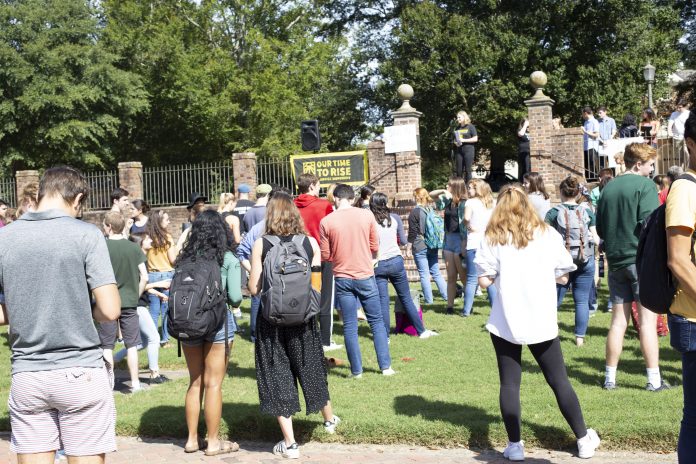Friday, Sept. 20, global climate strikes occurred across the United States and around the world in hopes of bringing awareness and change to the issue of climate change, including on our campus at the College of William and Mary.
The climate strike on campus was co-hosted by the Sunrise Movement and Young Democrats, and both groups were asked to speak about how climate change correlates to the student advocacy we foster on campus: immigrant rights’ and indigenous rights.
Unfortunately, to some people, the importance of our presence and words were erased because of the overwhelmingly white, upper-class audience that only reflects our entire campus.
Recently, some interesting points were brought up and executed unproductively in an opinions piece last week in The Flat Hat.
“Let’s call the Climate Strike last Friday […] what it was — shouting at the moon and pretending like you’re making a difference just so you can feel better. How ridiculously dishonest,” Gavin Aquin ’22 said.
Some people may be unfamiliar with the way movements work to enact change. There are many different levels and processes involved in a successful movement. Of course, the biggest component of activism is action. But how do we get people engaged? How do we let others know of the actions necessary? We tell them. With every successful movement, there are words and there are speakers. These discussions happen alongside action. Demonstrations and strikes are just as important as planting trees. Words shared at these demonstrations and protests help to inspire others to build bonds, plant trees, recycle, contact officials and become aware of their relationship with the ‘environment.’
“Let us […] pretend that fossil fuel billionaires even remotely cared what a bunch of 20-somethings thought — what are they going to do, just cease to exist? How about the politicians who jump at their whim — just stop taking money from the fuels lobby?” Aquin said.
The Civil Rights movements took decades in the making, and we still see its effects to this day. Feminism hit the western world in five major waves throughout the past century or so. The climate change movement hasn’t been any different. The exchange between corporations and politicians will not cease to exist immediately, but with more protest and awareness these transactions will lessen as we place pressure on these groups so that they may be held accountable for their actions.
“Talk about elitism,” Aquin said.
As first-generation college students and women of color we recognize that we are fortunate to be attending the College, or any higher institution of learning for that matter.
We are reminded every day that our immigrant parents sacrificed more than we will ever be able to payback.
We choose to voice our opinions unapologetically especially if it means speaking on or protesting an issue that hits close to home, an issue that affects our people first and foremost, an issue that has unfortunately left our families, families we know,and our communities at a disadvantage.
We will use our place of “privilege” and our “elite” status to speak on what we believe is right because there are people who cannot.
Finally, to the notion that we are “faux environmentalists” because we talk about doing things and don’t do them: we find it bold to assume that about a whole group of people. Clearly, we are passionate enough to speak about the issue of climate change we must already be trying to do something about it, no? Did you listen to our speeches? Those who attended as audience members listened in hopes of learning how they can support change.
In conclusion, it is 2019 and we are experiencing a shift in a movement that black, indigenous and brown people have been fighting for as a means for survival for longer than people have been advertising recycling. However, now that the movement is more visible on a global scale, in some part in solidarity with these communities, but mostly through the media attention of white activists — there are certain steps needed at a multitude of levels to ensure action: awareness, education, mobilization and community-building. While this movement has originated and been led by the people most affected by climate change, it will only continue to spread and grow with as many action-minded people from all backgrounds.
it is important to remember that in a movement, it is necessary to engage in paradoxical critique at every level — without making uninformed assumptions and statements about people’s experiences.

